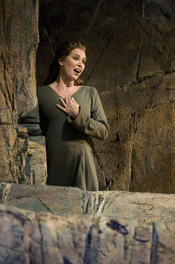When in his stage directions Wagner said “tree,” scenic designer Thomas Lynch gave him one — or, in the case of Act One of Die Walküre — an entire forest of entangled trunks and branches. And director Stephen Wadsworth seemed content to tell the story as straightforwardly as possible. This was clearly not a concept Ring rooted in the writings of Marx or Freud and it made no attempt to come to terms with Germany’s tormented past — and Wagner’s involvement in it.
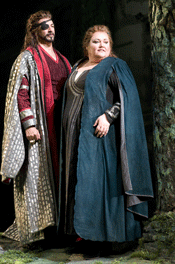 Greer Grimsley (Wotan) and Stephanie Blythe (Fricka). © Rozarii Lynch photo
Greer Grimsley (Wotan) and Stephanie Blythe (Fricka). © Rozarii Lynch photo
On the heels of the second SO Ring, completed in 1986 and on stage for the next decade, it disappointed many. For in that earlier production Swiss director François Rochaix and designer Robert Israel offered a post-modern “take” on the cycle, focused visually on the machinery with which Wagner had sought to make the Ring live.
However, with the revival of the Wadsworth Ring this summer, the production has grown and matured, and this largely because the director, a seasoned veteran of the spoken theater, has remained with it and taken advantage of its return to the stage of the Marion Oliver McCaw Hall to reveal his own deeper insights into what is no doubt the greatest single operatic achievement of all time.
Wadsworth — to reduce so remarkable an achievement to a single word — has humanized the Ring, continuing and perfecting the process that began with the first post-war Bayreuth Ring directed by Wieland Wagner in 1952. At that time the composer’s grandson “sanitized” the mammoth work, stripping it of the swords, spears and winged helmets that had helped — with willing participation of his family — to make Wagner the court composer of National Socialism. Wieland Wagner acted out of necessity, knowing that only a non-political Ring would be acceptable to a world still up to its ankles in the ruins of World War Two. And now Wadsworth capitalizes on the experiences of the half century since that revolutionary Ring to bring to the surface in it the universal humanity of a story, in which the participants are only outwardly super-human gods and giants. The result is a Ring in which the audience is totally absorbed by the intimacy of the story as Wadsworth leads them through it.
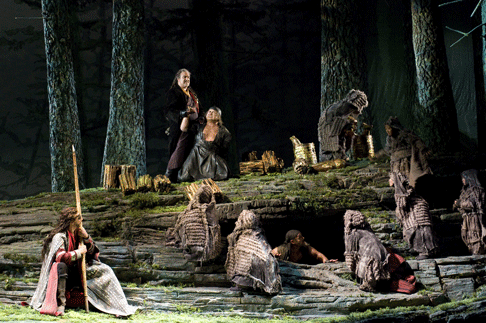 Front: Greer Grimsley (Wotan) and Dennis Petersen (Mime); Back: Kobie van Rensburg (Loge) and Richard Paul Fink (Alberich); and the Nibelungs. © Rozarii Lynch photo
Front: Greer Grimsley (Wotan) and Dennis Petersen (Mime); Back: Kobie van Rensburg (Loge) and Richard Paul Fink (Alberich); and the Nibelungs. © Rozarii Lynch photo
Happily, Seattle Opera, celebrating a quarter century under the erudite leadership of Speight Jenkins, has provided the director with everything needed to make the staging as moving as it is monumental. Seattle’s choice of Janice Baird as the season’s Brünnhilde had been the most heavily hyped opera news of the summer. Billed by Opera News as the new Wagnerian “it girl,” the American soprano had the audience understandably eager to hear what she could do. And the war cry with which Baird made her entrance in Act Two of Walküre on August 10 was indeed impressive. In sheer force, however, she was no match for Jane Eaglen, Brünnhilde in Seattle from 2000 through 2005, nor — for those old enough to remember her — for Linda Kelm, Seattle’s major singer in the role in the ‘80s. When, however, Baird dug into the drama in her first exchange with Wotan her total command of the role and its dramatic power were overwhelming.
She is an intelligent singer who knows this work thoroughly from European productions and she responded magnificently to Wadsworth’s direction. That, for example, she came down from her rock to tell Siegmund that he would die was a fine touch. Kneeling with her half-brother at the side of the sleeping Sieglinde, their duet became almost a trio. It was, of course, as the woman betrayed that Baird revealed the full extent of her powers in Götterdämmerung. She sang the concluding immolation with a searing sense of transcendent tragedy. And that she is a beautiful person of regal bearing made her an ideal figure for Wadsworth’s approach to the Ring.
She had an equal both in vocal and acting ability in Greer Grimsley as the Wotan of the summer. Tall and handsome, Grimsley delivered a finely nuanced portrayal of the errant god.
One of the most glorious moments of the cycle, however, was Stephanie Blythe’s warning monologue to Brünnhilde in “Götterdämmerung.” Now a major Wagernian, the American mezzo elevated this to the dramatic level of Wotan’s farewell and of Brünnhilde’s final immolation. And as the Fricka of the summer Blythe played a woman still hesitant to admit the waning of a once-great passion.
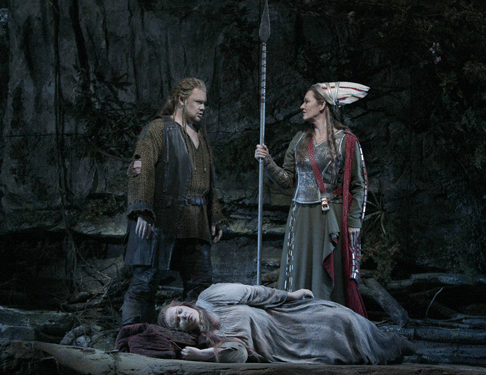 Stuart Skelton (Siegmund), Margaret Jane Wray (Sieglinde), and Janice Baird (Brünnhilde). © Chris Bennion photo
Stuart Skelton (Siegmund), Margaret Jane Wray (Sieglinde), and Janice Baird (Brünnhilde). © Chris Bennion photo
Sieglinde has long been a signature role for Margaret Jane Wray, whose voice has darkened beautifully in recent years. She also sang the Third Norn in Götterdämmerung.
Over half the cast of the ’09 Ring was new to the Seattle staging, to which Australia’s Stewart Skelton and Denmark’s Stig Andersen made stellar contributions. Skelton displayed the most refined command of German diction in the cast, while Andersen was an enviably youthful Siegfried who matured markedly through the two Ring operas in which he appears.
Richard Paul Fink remains the world’s ruling Alberich, while Dennis Petersen played a remarkably masculine Mime, eschewing the elements of parody that cause many to see this figure as an expression of Wagner’s anti-Semitism.
South Africa’s Kobie von Rensburg was a witty and wily Loge, while Andrea Silvestrelli and Daniel Sumegi were well-matched giants Fasolt and Fafner.
In Walküre Silvestrelli was an especially loathsome Hunding, while Sumegi as Hagen offered a profound essay in the darkness of the human heart.
Conductor Robert Spano is now a well-seasoned Wagnerian, who understands the necessity of letting the composer have his way, allowing the music to unfold by its own inner — and organic — rules. The enlarged orchestra — drawn largely from the Seattle Symphony — played stunningly.
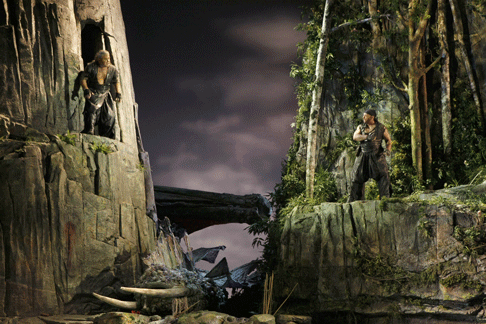 Richard Paul Fink (Alberich) and Dennis Petersen (Mime). © Chris Bennion photo
Richard Paul Fink (Alberich) and Dennis Petersen (Mime). © Chris Bennion photo
Among the many magic moments were the brief but breathless pause that Spano and Grimsley inserted between the crucially visionary “das Ende” and the repeat of the words, sung here not with Hans Hotter’s long-traditional Sprechstimme, but rather with melancholy lyricism. And Spano’s elucidation of the shadings of sexual development that color the Awakening Scene at the end of Siegfried made the work of other conductors with this incredibly complex section of the drama seem at best Biology 101.
About some things Wagner allowed Wadsworth no choice. The eight Walküre whooped it up as they are wont to do, but no glorification of heroic death. And against Siegfried’s re-forging of the sword Nothung even Wadsworth was helpless. (Someone once suggested replacing this bit of banality with help from Gershwin: “I got plenty of Nothung, and Nothung’s plenty for me!”) And the excess of huggie-kissie throughout the cycle fell into the category of human, all-too human.
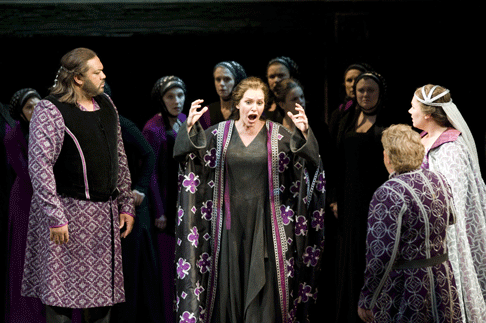 : Gordon Hawkins (Gunther), Janice Baird (Brünnhilde), Stig Andersen (Siegfried), and Marie Plette (Gutrune), with supernumeraries and members of the Seattle Opera chorus. © Rozarii Lynch photo
: Gordon Hawkins (Gunther), Janice Baird (Brünnhilde), Stig Andersen (Siegfried), and Marie Plette (Gutrune), with supernumeraries and members of the Seattle Opera chorus. © Rozarii Lynch photo
The designs and costumes by Lynch and Martin Pakledinaz seems to have grown richer in color and beauty — due perhaps to increasingly sophisticated lighting by Peter Kaczorowski. This is clearly the current forerunner among American Rings, and one looks forward to its return for a final run in 2013.
Wes Blomster
